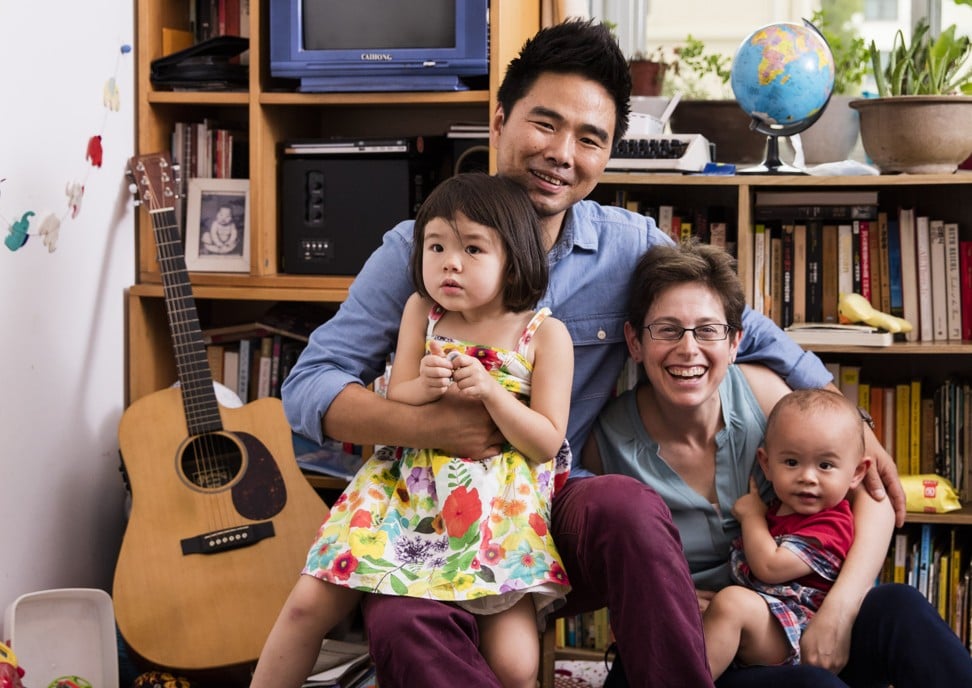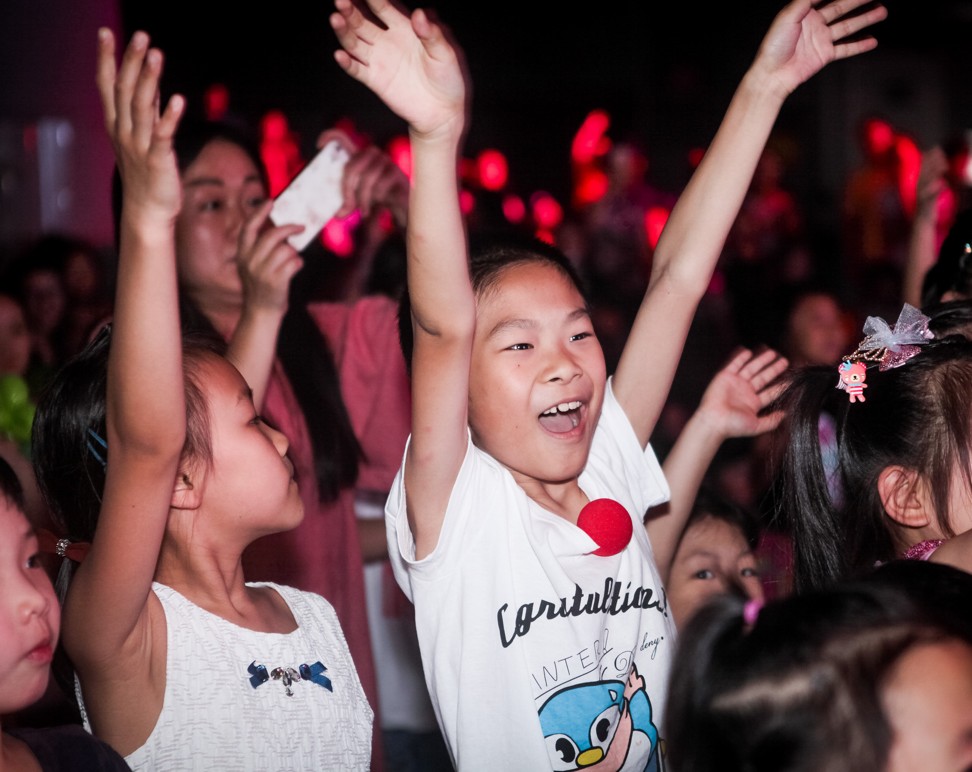
Creators of China’s first touring music festival for children want better music for country’s kids – and somewhere parents can still rock
Shocked at the state of children’s music in China, Liu Jian and Rebecca Kanthor created Hand in Hand, a festival for whole families, and hope to grow to 100 Chinese cities over the next five years
A lot has changed in China since folk musician and author Liu Jian, 39, was a boy, but one thing that hasn’t changed is the music children listen to.
Alongside breakneck economic growth, urbanisation and internationalisation, it came of something of a surprise to Liu and his American wife, writer Rebecca Kanthor, 38, that the Chinese music available for children has remained unchanged for generations.
How can I get my children to listen to ‘cool’ music?
When they were searching for music for their own daughter, now five, to listen to, it became apparent that contemporary children’s music in the West was surprisingly diverse and high quality, and the Chinese equivalent was non-existent.
“Over the past couple of decades so much has happened in China,” Liu says. “It has developed at such a fast pace – everything except children’s music, and I don’t know why. I’m even a bit angry at myself because I am a musician. Why wasn’t I doing anything about it?”

In hindsight, it seems Liu and Kanthor were ideally placed to fill this void. They met through music – at a concert – and recall that some of the best moments of their married life before having children were at shows and festivals. However their single outing to a music festival after their eldest daughter was born – the couple now also have a two-year-old son – was a complete disaster.
“We put our daughter in the stroller, and once we got there she wouldn’t stop crying. Plus it was raining. I think the music was too loud for her, there was no place to change her diaper,” Liu says.
“After that experience, I said to my wife, let’s not do that again – music festivals are for young people, they aren’t for families. She was really angry because she didn’t want to have to completely change who we are because we have children, but it wasn’t a good experience.”
A CD brought to Shanghai – where the family are based – from the US by Kanthor’s mother also proved revelatory. When the opening chords from a song by children’s group Lucky Diaz and the Family Jam Band came out of the speakers, Liu couldn’t believe his ears.
Not only was the musicianship of a high standard, but the lyrics of the songs contained messages of friendship, self-esteem and cooperation that Liu and Kanthor could also see were valuable messages to spread to children in China.
“It was such good music; I couldn’t believe this was children’s music,” Liu says. “On that day, I said to my wife, ‘Let’s bring this band here to China, if only for our own kids to experience and learn there is this kind of great kids’ music out there.’”
Put classical music in the hearts of Hong Kong children, minister urges
So, the idea for the Shou la Shou or Hand in Hand International Children’s Music Festival was born. Designed for children and families to enjoy, everything from the venues to the lighting and volume would be set up to accommodate the needs of its young audience members.
It would be a further three years of careful consideration and planning before it became a reality, with the first iteration in mid-2017 touring five cities in China to crowds totalling more than 15,000.
The couple joke that they held the first show in Nantong – a third-tier city in Jiangsu province, two hours north of Shanghai – so no one would know if it was a complete failure. It saw the aforementioned Lucky Diaz and the Family Jam Band take the stage alongside Dutch kid-rock band Hippe Gasten.
Even though Liu and Kanthor believed there was room in China for children to experience good music in a fun and child-friendly festival environment, they were nervous.
“We really didn’t know what to expect. We didn’t know whether Chinese kids would like this kind of music,” Liu says.
“I even told the bands to be prepared for the kids not to jump up and down,” Kanthor adds. “Maybe their parents would make them sit quietly. We were so worried about that.”
Kanthor explains they didn’t know who was going to turn up to that first show. “But then all these families showed up and during the first song everyone jumped up and started dancing. I cried, I was so proud of them.”

The wild reception the children had to the music came as something of a surprise, but it was the parents’ reactions that really blew Liu and Kanthor away. In show after show, the stereotype of reserved Chinese parental units was blown away as the parents, and even grandparents, jumped around and danced with abandon.
“In Chengdu, there was a point where the Dutch band invited people up on stage and this grandma just jumped on the stage, she was so excited to be there,” Kanthor says. “I thought later that she had come with her daughter and her granddaughter, and I was so moved to think about three generations being able to have a great time together.”
Cai Rong was one of the mothers in the crowd at the Nantong show, accompanying her 11-year-old son, Li Ruiqi.
“All the children left their seats and danced with the performers, and the parents’ moods were ignited by the passion of the children,” Cai says.

Like Cai’s son, who has been learning the violin since the age of five and is already an award-winning performer, music is ingrained in the lives of many Chinese children from an early age – but more as something to be studied and accomplished, rather than purely to be enjoyed with family and friends.
Today’s parents of young children, largely from the post-’80s generation, are the first Chinese parents in recent memory to have lived their entire lives in a country of increasing prosperity and opportunity.
The vast majority are only children, the beneficiaries (though some would say victims) of the entirety of their parents’ attentions, affections and educational investments. Now, as young parents themselves, many are unburdened by student loans or mortgages (Chinese parents routinely buy a flat for their son when they are to be married). These young, middle-class parents have disposable incomes, and they are ready and willing to spend it on time with their children.
The first time I heard rock music I was 16, but wouldn’t it be great if Chinese kids could hear and experience good music from a younger age
Spending on parent-child activities in China is expected to exceed three trillion yuan (US$462 billion) in 2018, according to a research report by Analysys, up from two trillion yuan (US$308 billion) in 2015.
Also on the rise is China’s music industry, with the China Audio-Video and Digital Publishing Association showing year-on-year increases of around 8 per cent in recent years. All the figures are positive indicators for the future of children’s music and musical performances in China, and make it all the more surprising that the sector has remained untapped until now.
The first successful run of Hand in Hand shows has led to a second tour of China this month, with the same line-up this time performing in Shanghai, Hangzhou and Nanjing, and ambitions to grow the festival to 100 Chinese cities over the next five years.
This mission to take high-quality children’s music beyond China’s biggest cities and into the hinterlands is a particularly personal one for Liu, who himself is from a small town, Dongan, in Henan province.
Let children play musical instruments, their way
He was in high school when he discovered rock music, with Chinese greats, such as Cui Jian and Tang Dynasty, leading the young man off the predetermined path envisioned by his parents and along another road altogether.
The teenaged Liu grew his hair long and started playing guitar. He dropped out of school and, eventually, packed up his guitar and joined the army. After four years of service, he passed the test to join the army’s top arts academy in Beijing. He moved to the capital to pursue music, meeting his own idols and eventually touring the country as a folk musician.
“Music gave me the impetus to choose my own life, my own path. The first time I heard rock music I was 16, but wouldn’t it be great if Chinese kids could hear and experience good music from a younger age. I want them to maybe hear the music and they can have a dream. It doesn’t have to be a dream about making music, it can be any dream,” Liu says.
“Children are a country’s future and children from smaller places are just as much the future of China as kids in Shanghai and Beijing. They should have equal opportunities to hear this stuff. We can make money if we just stay in big cities, but we are prepared to do more because it’s really important.”
